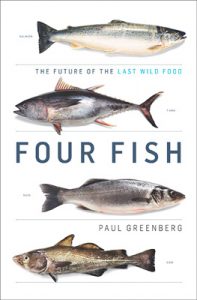Eat more fish. Fish is good for you. Fish has too much mercury. Wild fish is best. Only eat fish on the “green” list. Tilapia is a bottom feeder. Salmon is has the most omega 3s. Salmon farming is evil. Avoid farmed fish.
Sound familiar? The messages surrounding fish can be quite confusing. So when I heard about Four Fish: The Future of the Last Wild Food by Paul Greenberg I immediately requested a review copy. I hoped to finally get to the bottom of what I was supposed to be doing.
From the publisher’s website:
Our relationship with the ocean is undergoing a profound transformation. Whereas just three decades ago nearly everything we ate from the sea was wild, rampant overfishing combined with an unprecedented bio-tech revolution has brought us to a point where wild and farmed fish occupy equal parts of a complex and confusing marketplace. We stand at the edge of a cataclysm; there is a distinct possibility that our children’s children will never eat a wild fish that has swum freely in the sea. In Four Fish, award-winning writer and lifelong fisherman Paul Greenberg takes us on a culinary journey, exploring the history of the fish that dominate our menus—salmon, sea bass, cod and tuna-and examining where each stands at this critical moment in time. He visits Norwegian mega farms that use genetic techniques once pioneered on sheep to grow millions of pounds of salmon a year. He travels to the ancestral river of the Yupik Eskimos to see the only Fair Trade certified fishing company in the world. He investigates the way PCBs and mercury find their way into seafood; discovers how Mediterranean sea bass went global; Challenges the author of Cod to taste the difference between a farmed and a wild cod; and almost sinks to the bottom of the South Pacific while searching for an alternative to endangered bluefin tuna. Fish, Greenberg reveals, are the last truly wild food – for now. By examining the forces that get fish to our dinner tables, he shows how we can start to heal the oceans and fight for a world where healthy and sustainable seafood is the rule rather than the exception.
This book goes into quite a bit of detail about the history of fish, and suffice it to say if you like history you’ll love this book; if not, you may find yourself skimming a bit. As a locavore, I hoped the message would be to catch your own fish or buy locally caught wild fish. Unfortunately, as the author pointed out, we really don’t know how many fish are out there, and many are endangered. He is also pessimistic about people choosing only fish on the “green” list (like the ones supplied by Monteray Bay Aquarium) making any real dent in the problem.
This book pretty thoroughly covers the pros and cons of wild vs. farmed fish, and I was surprised at some preconceived notions that I held which were inaccurate. Namely, farmed fish aren’t always detrimental to the environment. Not all farms are like CAFOs on land, nor are they at sea. I also started to realize that we put so much junk in the ocean that “wild caught” fish are possibly just as polluted–maybe more so–than the farm raised. Hmmm. Lots of thoughts to ponder.
In the end, he advocates a worldwide wildlife management approach to our global fishing. Can all the countries involved in fishing/whaling/etc. agree? I’m sort of doubtful. And so I find myself more educated about the issue, but no more clear on what I should do as an individual.



The Scribe Family really needs to eat more fish. Red meat has got to go…Happy Friday! SITS sent me by, and I’m glad they did…
I’ve Looked at Clouds from Both Sides Now
A friend of mine was just telling me about this book this week! It sounded very interesting and I definitely want to give it a read. It’s scary when you see the facts on the dwindling numbers of wild fish. That the book doesn’t provide any suggested solutions is a bit frustrating, but awareness is always the first step towards correcting a problem.
I’m a subscriber!
I’m a twitter follower!
I would like to read it. I know of at least one country that won’t follow the rules to limit fishing. It will never happen. I would love to read this book.
twoofakind12@yahoo.com
I am a email subscriber.
twoofakind12@yahoo.com
this is something I have been wanting to know for ages. This book will certainly help
it is always a question to me in different permuations – is the “free”/”wild”/”cage free” – really better than what is raised? (raised somewhat ethically of course and not overdosed w/ antibiotics) or are we just telling ourselves a store to make ourselves feel better? and it is likely a combination. so i would be interested in the book to learn more about the pros and cons of “wild caught” fish
already subscribe to your blog
I follow by email and would love to read this book. I think we all need to try to be better informed about our food choices. Unfortunately, sometimes the more I read, the more confused I become.
Any way to spread the message of sustainable seafood is a must read for me!
Hey! Just stopping by a little late from the friday green blog hop. Following you on twitter now. Love your blog! Hope you get a chance to stop by and check out mine. Lots of ecofriendly giveaways, coupons, freebies, and recipes! Have a great weekend!
Diane
http://www.turning-the-clock-back.blogspot.com
This book sounds interesting from both a dietary perspective (learning about the fish I eat) and a natural history perspective. Thanks for the review.
I subscribe to your blog.